I guess I am the last one to chime in on this piece in the NY Times on economics and its failure to act more like a science. Since this goes well with some of the recent discussions here, I’ll just summarize my general views:
- Most of economics involves conforming a political bias with a world view. For instance, most Keynesians start with government spending and taxing, how those government policies can influence the economy and then interpret a “model” in such a way that confirms their political bias. Monetarists start with the central bank and interpret a more laissez-faire view of a “model” to interpret how policy can impact the economy. Austrians start with the private sector and build a “model” that seeks to eliminate government. So on and so forth. Every “school” of economics has a very specific ideology and the political lines are very clearly drawn. This doesn’t even approach “science”. It’s more like religion.
- If economics were more of a science it would start with stylized fact. It would start purely with how the system works and how it functions at the operational level instead of looking at how a certain political entity can use certain policies to conform to a particular world view.
- Why did most economists fail to predict the crisis or prescribe the right cures? Because they’re not working from the foundation of stylized fact. They’re working from a policy bias position that renders their world view inapplicable much of the time.
- So, what is economics good for? Unfortunately, not very much given that so much of it is really just a policy debate masquerading as a scientific debate. And until we start getting more scientific, like say, trying to figure out how key institutions (like banks) in our monetary system operate, then we’re just chasing our own tails thinking that economics is useful.
Mr. Roche is the Founder and Chief Investment Officer of Discipline Funds.Discipline Funds is a low fee financial advisory firm with a focus on helping people be more disciplined with their finances.
He is also the author of Pragmatic Capitalism: What Every Investor Needs to Understand About Money and Finance, Understanding the Modern Monetary System and Understanding Modern Portfolio Construction.


Comments are closed.